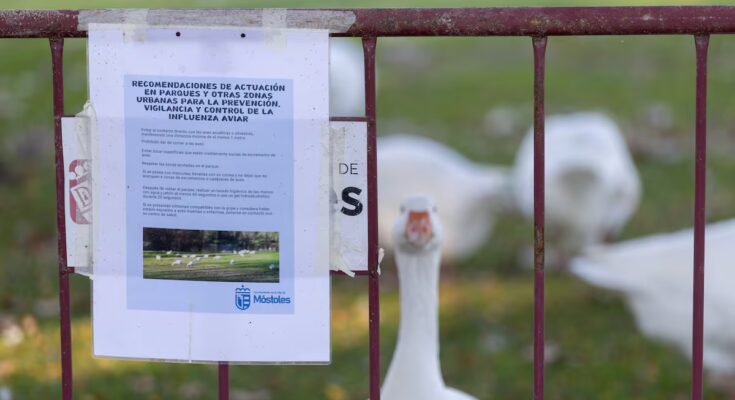804,982.94 euros was the price that the Community of Madrid had to pay to control the largest avian flu epidemic and the first among poultry recorded this year in the region. This is a laying hen farm in Valdemoro where 450,000 birds were sacrificed due to this highly contagious and deadly disease for animals. The company Tragsatec was commissioned to carry out these tasks, which aim to stop the spread of the flu throughout the territory of Madrid and its surroundings.
The order included the destruction, disinfection and burial of almost half a million chickens from this macro farm in Valdemoro, according to a spokesperson for the Ministry of the Environment, Agriculture and the Interior. Part of the financing comes from European funds and the Ministry of Agriculture.
The first outbreak of highly pathogenic avian influenza, of the H5N1 subtype, in the region was discovered on September 22 in the Andalusia park, in Alcobendas, but affected only wild birds, in particular two geese. From that moment on, a preventive plan was activated in various areas of the Community.
However, on 1 October a new outbreak was discovered, in this case of poultry, on a laying hen farm in the municipality of Valdemoro, which represented a particular danger due to the number of specimens in contact. As the days passed, other municipalities in Madrid joined the list: Móstoles, Alcorcón, Leganés and Fuenlabrada recorded outbreaks of wild birds and Torrejón de Velasco and Ciempozuelos recorded outbreaks of captive birds. However, as the Environment spokesperson points out, none of them required interventions like that of Valdemoro.
The capital had remained free of the disease until the first case was reported on October 30, a peacock in the central Retiro park. The Municipality of Madrid has assured that so far it is the only animal affected in the municipality and that no worker who came into contact with the bird has been infected. The Community of Madrid has therefore activated the protocol of health measures to prevent the spread of the disease for the entire city, active only in the north area since the first outbreak was discovered in Alcobendas.
The measures imposed by the Ministry of the Environment, Agriculture and the Interior for fifteen municipalities affected, or close to the outbreaks, include the ban on hunting the species most subject to the disease, such as geese and ducks, and on breeding them with other species; raise birds outdoors as much as possible; the supply of water to poultry if it comes from sources accessible to wild birds; or mandatory disinfection of people and vehicles visiting such farms.
According to the ministry document, “Highly pathogenic avian influenza causes systemic disease (unlike low pathogenic influenza, which causes mild disease) and is extremely contagious, with high mortality within 24 hours in commercial poultry farms.” Although highly contagious among these animals, the H5N1 subtype of the disease does not have significant zoonotic capacity, meaning it is unlikely to transmit to humans and cannot do so through cooked poultry meat, eggs or processed products derived from them.
The first outbreak in Spain was detected in March in a peregrine falcon and in July, the first in domestic birds, in a turkey farm. This latest case broke the two-year streak in which national farms were free of the disease, since February 2023, when the last outbreak was recorded in Lleida until then. The consequences of these new outbreaks have reached exports: this summer China banned the entry into its territory, directly or through third countries, of fresh and processed meat and poultry from Spain.



